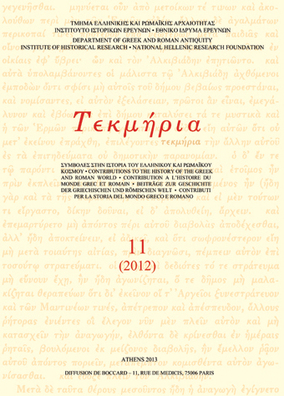Ὁ "κλᾶρος" στὴ μεγάλη δωδεκάδελτο ἐπιγραφὴ τῆς Γόρτυνος
Part of : Τεκμήρια ; Vol.5, 2000, pages 71-86
Issue:
Pages:
71-86
Parallel Title:
The κλᾶρος in the law of Gortyn
Section Title:
Articles
Author:
Abstract:
The definition of the semantic content of the κλαρος in the Law Code of Gortyn remains an open issue in modern research. The word κλαρος appears only once in the provisions regarding the intestate hereditary succession, and it indicates all those heirs who laid claim to the inheritance, when there were no immediate descendants or any other next of kin. In such cases the succesion devolved upon the κλαρος. Several scholars maintain that the term κλαρος designates the serfs of the ancestral estate, whereas others identify the κλαρος with the clan of the inheritor. The view has also been held that the members of the κλαρος were entitled to inherit the property as joint proprietors of a larger territory, part of which was also the allotment of the deceased person. Using the conditions of land distribution in ancient Thessaly as an auxiliary, we suggest that the rural area of Gortyn was devided into broader territorial units, which comprised several smaller lots. Based on this assumption, we express the view that the Gortynian legislators use the phrase οϊτινες κ' ϊοντι ό κλαρος to designate the citizens, — the heads of families — whose lots formed the κλαρος to which the lot of the deceased belonged. This view is based on the interpretation on the sources; definite conclusions can only be reached with the help of the results of the archaeological research, which is being conducted in the area of Gortyn by the Italian School of Archaeology.
Subject:
Subject (LC):




